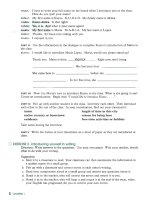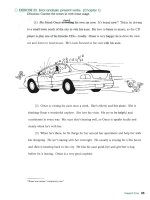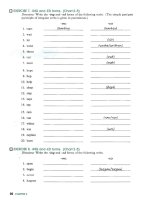Fundamentals of english grammar third edition part 29 ppsx
Bạn đang xem bản rút gọn của tài liệu. Xem và tải ngay bản đầy đủ của tài liệu tại đây (354.74 KB, 7 trang )
EXERCISE
32.
Forms of OTHER. (Charts 6-14 and 6-15)
,.
Directions:
Perform the following actions.
a,.
.,
.
.
.:
1.
Hold two pens. Use a form of
other
to describe the second pen.
+
I'm holding mo pens. One is mine, and the other belongs
w
Ahmed.
2.
Hold three pens. Use a form of
other
to describe the second and third pens.
3.
Hold up your two hands. One of them is your right hand. Tell us about your left
hand, using a form of
other.
4.
Hold up your right hand. One of the five fingers is your thumb. Using forms of
other,
tell us about your index finger (or forefinger), then your middle finger, then your ring
finger, and then your little finger, the last of the five fingers on your right hand.
5.
Write two names on the board. Use a form of
other
in your description of these
names.
6.
Write five names on the board and tell us about them, using forms of
other
in your
descriptions. Begin with "One of the names on the board is
. . . ."
0
EXERCISE
33.
Plural forms of OTHER. (Chart 6-15)
Directions:
Complete the sentences with
other($
or
the other($.
1.
There are many kinds of animals in the world. The elephant is one kind. Some
0Um-s
are tigers, horses, and whales.
2.
There are many kinds of animals in the world. The elephant is one kind. Some
kinds are tigers, horses, and whales.
3.
There
are
three colors in the U.S. flag. One of the colors is red.
are white and blue.
4.
There are three colors in the US. flag. One of the colors is red.
colors are white and blue.
5.
There are four birds in the picture. One is an eagle, and another one is a crow.
birds in the picture are chickens.
6.
There
are four birds in the picture. One is an eagle, and another one is a crow.
are chickens.
184
CHAPTER
6
7.
There are four seasons. Spring and summer
are
two.
.$S;>A~
,
.
,.
.
are
, ,
~
&*;
.'
.
.I
I
.
~
~~
fall and winter.;
:
:.,
-
.,.
.
,
.:,*.I
.
>/l
.
. .
.
8.
Spring and summer
are
two of the four seasons.
seasons
are
fall and winter.
9.
There are many kinds of geometric figures. Some
are
circles.
figures are squares. Still
are rectangular.
10.
There are four geometric figures in the above drawing. One is a square.
figures are a rectangle, a circle, and a triangle.
11.
Of the four geometric figures in the drawing, only the circle has curved lines.
have straight lines.
12.
Birds have different eating habits. Some birds eat insects.
a.
birds get their food chiefly from plants.
b. eat only fish.
c.
hunt small animals like mice and rabbits.
d.
buds prefer dead and rotting flesh.
13.
A:
There were ten questions on the test. Seven of them were easy.
three were really hard.
B: Any question is easy if you know the answer. Seven of the questions were easy for
you because you had studied for them.
were hard
because you hadn't studied for them.
14.
Many people like to get up very early in the morning.
like
to sleep until noon.
15.
A:
What do you do when you're feeling lonely?
B: I go someplace where I can be around
people. Even
if
they are strangers, I feel better when there are
around
me. How about you?
A:
That doesn't work for me. For example, if I'm feeling lonely and I go to a movie
by myself, I look at all
people who are there with their
,.
friends and family, and I start to feel even lonelier. So I my to find
things to do to keep myself busy. If I'm busy, I don't feel lonely.
Nouns and Pronouns
185
16-16
SUMMAKY OF FOKMS OF
CXl'HEK
Notice that the word
others (other
+final
-s)
is
used only as a plural pronoun.
other av~les
the other
the other apples the others
EXERCISE
34.
Forms
of
OTHER. (Charts 6-12
-
6-16)
Directions:
Complete the sentences with correct forms of
other:
another, other, others,
the other, the others.
1.
Jake has only two suits, a blue one and a gray one. His wife wants him to buy
mo).hev
one.
2.
Jake has two suits. One is blue, and is gray.
3.
Some suits are blue. are gray
4.
Some suits have two buttons. suits have three buttons.
5.
Some people keep dogs as pets.
have cats. Still
people have fish or birds as pets. Can you name
kinds of animals that people keep for pets?
6.
When
I
was a kid,
I
had two pets. One was a black dog.
was an orange cat.
7.
When
I
walked into the classroom on the first day, the room was empty.
I
sat down at
a desk and wondered if
I
was in the right room. Soon
student came and took a seat. Then a few
followed, and
the room slowly began to fill.
8.
My boyfriend gave me a ring.
I
tried to put it on my ring finger, but it didn't fit. So
I
had to put it on
finger.
9.
People have two thumbs. One is on the right hand.
is on
the left hand.
10.
There are five letters in the word "fresh." One of the letters is a vowel.
are consonants.
11.
Smith is a common last name
in
English.
common names
are Johnson, Jones, Miller, Anderson, Moore, and Brown.
186
CHAPTER
6
EXERCISE 35. Forms of
OTHER.
(Charts 6-12
+
6-16)
Directions
Complete the sentences
with
your own words. Use a form of
other
in the
blank. If you write the completed sentences, underline the forms of
other.
Example:
I have.
.
.
books on my desk. One is
.
.
.
,
and
islare
.
.
. .
+
I
have three books on my desk. One
is
a grammar book, and
the
orhers
are
nzy
dicrionary and a science book.
1.
I
have two favorite colors. One is
.
.
.
,
and
is
2.
Some students walk to school.
3.
Ted drank.
. .
,
but he was still thirsty, so
one.
4.
I
speak
.
.
.
languages. One is
. .
.
,
and islare
5.
Some people
.
. .
,
and
. .
.
.
6.
I have
.
. .
sisters, brothers, andlor cousins. One is
.
. .
,
and
islare
. .
7.
One of my teachers is
.
. . .
islare
. .
. .
8.
.
.
.
and
.
. .
are two common names in my country.
are
.
. . .
9.
. .
.
of the students in my class are from
.
. .
.
students are from
. .
.
.
10.
There are many popular sports in the world. One is
.
. . .
IS
are
0
EXERCISE 36. Error
analysis:
summary revlew of nouns and pronouns. (Chapter
6)
Directions:
Correct the errors.
wishes
1.
The fairy godmother told the boy to make three
twish7
2.
I had some black beans soup for lunch. They were very good.
3.
The highways in my country are excellents.
4.
My mother and father work in Milan. Their teacher's.
5.
Today many womens are miner, pilot, and doctor.
6.
My wife likes all kind of flower.
7.
We often read story in class and try to understand all the new word. I can't remember
all of it.
Nouns
and
Pronouns
187
8.
There are two pool at the park. One is for childs. The another is for adults only.
9.
My brother has an apple's trees orchard.
10.
The windows in our classroom is dirty.
11.
In
addition to the news about the flood, I heard some others importants news this
morning.
12.
The population of my hometown in
1975
were about
50,000.
Today they are more
than
150,000.
13.
I don't like my apartment. Its in a bad neighborhood. Is trash on both side of the
street. I'm going to move to other neighborhood.
14.
Every people needs an education. With a good education, people can improve they're
live.
15.
Alice when was a child lived in a very little town in the north of Brazil. Today is a very
L
I*'
big city with many building and larges highways.
,
w
188
CHAPTER
6
CHAPTER
Modal
Auxiliaries
I
CONTENTS
-
-
-
The form of modal auxiliaries
Expressing ability:
can
and
could
Expressing possibility:
may
and
might
Expressing permission:
may
and
can
Using
could
to express possibility
Polite questions:
may
I,
could
I,
can
I
Polite questions:
would you, could
you, will you, can you
Expressing advice:
should
and
ought to
Expressing advice:
had better
7-9
Expressing necessity:
have to, have
got to, must
7-10
Expressing lack
of
necessity:
do not
have to
Expressing prohibition:
must not
7-1 1 Making logical conclusions:
must
7-12
Giving instructions: imperative
sentences
7-1
3
Making suggestions:
let's
and
why
don't
7-14
Stating preferences:
prefer, like
. .
.
better, would rather
C1
EXERCISE
1.
Preview: modal auxiliaries. (Chapter
7)
Directions:
Complete the sentences
with
to,
if
possible.
If not, write
0.
Discuss the
meanings of the helping verbs
in
imlics.
A:
I've
made a terrible mistake!
I
put the wrong numbers in my report. My report
shows that the company made lots of money, but the truth is we lost money. What am
I
going to dol? Should
I
[d
tell the boss about the accounting error?
1
B: Of course! You haw tell her. That error could get the company
2
3
in
big trouble.
A:
I
know that
I
ought
be honest about it, but I'm afraid she'll get angry. She
4
might
fire
me. Muld you go with me to see her?
5
6
B:
I
think
you had
beaer
do this yourself. You
can
do it.
7
8
I'm sure the boss
will
understand. You've got be brave.
9
10
A:
No, you must go with me.
I
can't
face her alone.
11
12
1
7-1
THE
FVKM
OF
MODAL
AUXILLAKIES
The
verbs
list4 below
are
called "modal auxiliaries." They are helping verbs that express a wide range of
meanings (ability, permission, possibility, necessity, etc.). Most of the modals have more
than
one meaning.
AUXILIARY
+
THE
SIMmE
FORM
OF
A
VERB
can
(a) Olga
can
eeah
English.
could
@)
He
couldn't
come
to class.
may
(c)
It
may min
tomorrow.
might
(d) It
mipht rain
tomorrow.
should
(e) Mary
should study
harder.
had
berm
(f) I
had betfor study
tonight.
must
(g)
Joe
must see
a doctor today.
will
(h)
I
will be
in class tomorrow.
would
(i)
Muld
you please
close
the door?
AUXIXJARY
+
TO
+
THE
SIMPLE
FORM
OF
A
VERB
have
to
(j)
I
haw
to study
tonight.
hawe got
to
(k)
I
have
got to study
tonight.
ought to
(1) Kate
ought to study
harder.
Can,
could,
may, might, should, had better, ma,
d,
and
would
are immediately followed by the simple
form of
a
verb.
They are not followed by
to.
INCORRECT: Olga can to speak English.
The main verb does not have a final
-s.
INCORRECT: Olga can speaks English.
The main verb is not in a past form.
INCORWCT: Olga can spoke English.
The main verb is not in its
-ing
form.
INCORRECT: Olga can speaking English.
To
+
the simpleform
is used with these auxiliaries:
haw
w,
have got
to,
and
ought
to.
EXERCISE
2.
The
form
of
modal
auxiliaries.
(Chart
7-1)
Directions:
Add
to
where necessary. If no
to
is necessary, write
0.
1.
I
have
+o
go downtown tomorrow.
2.
Tom must
d
see his dentist.
3.
Could you please
open the window?
4.
May
I
borrow your pen?
5.
A good book can
be a friend for life.
6.
I
ought
go to the post office this afternoon.
7.
Jimmy is yawning and rubbing his eyes. He must
be sleepy.
8.
I
have got
go to the post office this afternoon.
9.
Shouldn't you
save a little money for a rainy day?
10.
Poor Edward. He has
go to the hospital for an operation.
11.
Alex!
Stop! You must not
run into the street when there's traffic!
190
CHAPTER
7









